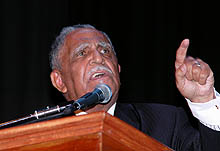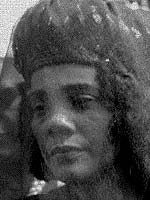Home > Bush "Weapons of Misdirection" Called Out at King Funeral: Break the Silence!
Bush "Weapons of Misdirection" Called Out at King Funeral: Break the Silence!
by Open-Publishing - Wednesday 8 February 20061 comment
Movement Discriminations-Minorit. Governments USA

King eulogists jab Bush at funeral
By Karen Jacobs and Tabassum Zakaria
Reuters
Tuesday, February 7, 2006
LITHONIA, Georgia (Reuters) - Speakers took a rare opportunity to criticize U.S. President George W. Bush’s policies to his face at the funeral on Tuesday of Coretta Scott King, widow of slain civil rights leader Martin Luther King Jr.
Civil-rights leader the Rev. Joseph Lowery and former President Jimmy Carter cited Mrs. King’s legacy as a leader in her own right and advocate of nonviolence as they launched barbs over the Iraq war, government social policies and Bush’s domestic eavesdropping program.
Bush sat watching the long service before an audience of 10,000 including politicians, civil rights leaders and entertainers at the New Birth Missionary Baptist Church in Lithonia, and a national cable television audience.
Lowery, former head of the Southern Christian Leadership Conference, which King helped found in 1957, gave a playful reading of a poem in eulogy of Mrs. King.
"She extended Martin’s message against poverty, racism and war/She deplored the terror inflicted by our smart bombs on missions way afar," he said.
"We know now there were no weapons of mass destruction over there/But Coretta knew and we knew that there are weapons of misdirection right down here/Millions without health insurance. Poverty abounds. For war billions more but no more for the poor."
The mourners gave a standing ovation. Bush’s reaction could not be seen on the television coverage, but after Lowery finished speaking, the president shook his hand and laughed.
Mrs. King, seen by many as the "first lady" of the American civil rights movement, died last week in a Mexican alternative health clinic at the age of 78, after complications from ovarian cancer and a recent stroke and heart attack.
Bush, speaking before his critics, said, "By going forward with a strong and forgiving heart, Coretta Scott King not only secured her husband’s legacy, she built her own."
With Washington debating the legality of Bush’s domestic eavesdropping on Americans suspected of al Qaeda ties, Carter also drew applause with pointed comments on federal efforts to spy on the Kings.
"It was difficult for them personally with the civil liberties of both husband and wife violated, and they became the targets of secret government wiretapping and other surveillance," he said.
Speaking later, Bush’s father, former President George Bush, broke any tension by recalling his own meetings as president with Lowery and gave a score: "Lowery 21, Bush 3, it wasn’t a fair fight."
Former President Bill Clinton, a favorite among mainstream civil rights leaders, was able to offer a teasing hint of the possible presidential candidacy of his wife, New York Democratic Sen. Hillary Rodham Clinton.

Bush "Weapons of Misdirection"
Called Out at King Funeral
By NEDRA PICKLER, Associated Press
Tuesday, February 7, 2006
Lithonia, Ga. (AP) —
President Bush, leading the nation in celebrating the life of Coretta Scott King, praised the civil rights leader for enduring extraordinary pain and loss to give generations of people "a better, more welcoming country."
"We knew Mrs. King in all the seasons, and there was grace and beauty in every season," Bush said at a New Birth Missionary Baptist Church service Tuesday that was attended by four presidents and a crowd of thousands.
"As a great movement of history took shape," Bush said, "her dignity was a daily rebuke to the pettiness and cruelty of segregation."
Bush noted that Mrs. King and the Rev. Martin Luther King Jr., her husband who was assassinated nearly 40 years ago, confronted vicious taunts, threatening phone calls and even the bombing of their home because of their early work for equal rights for blacks. Even after her husband’s slaying and in the years since, she never gave up, he said.
"Coretta had every right to count the costs and step back from the struggle," the president said. "But she decided that her children needed more than a safe home - they needed an America that upheld their equality and wrote their rights into law. And because this young mother and father were not intimidated, millions of children they would never meet are now living in a better more welcoming country."
The funeral took on political overtones as former President Carter said of the Kings: "It was difficult for them then personally with the civil liberties of both husband and wife violated as they became the target of secret government wiretaps." Later, he said that Hurricane Katrina showed that all are not yet equal in America.
And both Bush and his father winced as they sat behind the pulpit and heard the Rev. Joseph Lowery, who co-founded the Southern Christian Leadership Conference with Martin Luther King Jr., take several jabs at foreign and domestic policies.
"We know there were no weapons of mass destruction over there, but Coretta knew and we knew there are weapons of misdirection right down here," Lowery said, complaining that were far too many in the U.S. are living in poverty and without health care insurance.
"For war, billions more, but no more for the poor," Lowery continued, a take-off of a lyric from the song "A Time to Love" which drew a roaring standing ovation.
Bush’s father tried to defuse any political tension by joking that Lowery used to challenge him when he was president, too.
"I kept score in the Oval Office desk - Lowery 21, Bush 3," former President George H.W. Bush said. "It wasn’t a fair fight."
The audience showed where its allegiance lay when former President Clinton and his wife, Sen. Hillary Rodham Clinton, came to the podium to wild cheers and a long standing ovation. He opened by saying that he was honored to be with the other former presidents. Someone in the crowd yelled out, "Future president!" in reference to his wife’s possible 2008 bid.
"We can honor Dr. King’s sacrifice," Bill Clinton said. "We can help his children fulfill their legacy. ... Every one of us are in a way the children of Martin Luther and Coretta Scott King."
Outstanding Quote from Coretta’s Funeral Service:
"Who among us will join the freedom choir? Who among us will sing Coretta’s song with courage and conviction, to smother the cries of hatred, economic exploitation, poverty and political disenfranchisement? For whom does the bell toll? It tolls for you and for me."
- Atlanta Mayor Shirley Franklin

Martin Luther King:
Beyond Vietnam — A Time to Break Silence
There is at the outset a very obvious and almost facile connection between the war in Vietnam and the struggle I, and others, have been waging in America. A few years ago there was a shining moment in that struggle. It seemed as if there was a real promise of hope for the poor — both black and white — through the poverty program. There were experiments, hopes, new beginnings.
Then came the buildup in Vietnam, and I watched this program broken and eviscerated, as if it were some idle political plaything of a society gone mad on war, and I knew that America would never invest the necessary funds or energies in rehabilitation of its poor so long as adventures like Vietnam continued to draw men and skills and money like some demonic destructive suction tube. So, I was increasingly compelled to see the war as an enemy of the poor and to attack it as such.
Perhaps the more tragic recognition of reality took place when it became clear to me that the war was doing far more than devastating the hopes of the poor at home. It was sending their sons and their brothers and their husbands to fight and to die in extraordinarily high proportions relative to the rest of the population. We were taking the black young men who had been crippled by our society and sending them eight thousand miles away to guarantee liberties in Southeast Asia which they had not found in southwest Georgia and East Harlem. And so we have been repeatedly faced with the cruel irony of watching Negro and white boys on TV screens as they kill and die together for a nation that has been unable to seat them together in the same schools. And so we watch them in brutal solidarity burning the huts of a poor village, but we realize that they would hardly live on the same block in Chicago. I could not be silent in the face of such cruel manipulation of the poor.
My third reason moves to an even deeper level of awareness, for it grows out of my experience in the ghettoes of the North over the last three years — especially the last three summers. As I have walked among the desperate, rejected, and angry young men, I have told them that Molotov cocktails and rifles would not solve their problems. I have tried to offer them my deepest compassion while maintaining my conviction that social change comes most meaningfully through nonviolent action. But they ask — and rightly so — what about Vietnam? They ask if our own nation wasn’t using massive doses of violence to solve its problems, to bring about the changes it wanted. Their questions hit home, and I knew that I could never again raise my voice against the violence of the oppressed in the ghettos without having first spoken clearly to the greatest purveyor of violence in the world today — my own government. For the sake of those boys, for the sake of this government, for the sake of the hundreds of thousands trembling under our violence, I cannot be silent.
For those who ask the question, "Aren’t you a civil rights leader?" and thereby mean to exclude me from the movement for peace, I have this further answer. In 1957 when a group of us formed the Southern Christian Leadership Conference, we chose as our motto: "To save the soul of America." We were convinced that we could not limit our vision to certain rights for black people, but instead affirmed the conviction that America would never be free or saved from itself until the descendants of its slaves were loosed completely from the shackles they still wear. In a way we were agreeing with Langston Hughes, that black bard of Harlem, who had written earlier:
O, yes,
I say it plain,
America never was America to me,
And yet I swear this oath —
America will be!
Now, it should be incandescently clear that no one who has any concern for the integrity and life of America today can ignore the present war. If America’s soul becomes totally poisoned, part of the autopsy must read: Vietnam. It can never be saved so long as it destroys the deepest hopes of men the world over. So it is that those of us who are yet determined that America will be are led down the path of protest and dissent, working for the health of our land.
Hear the Mp3 of the Speech at:
– http://www.americanrhetoric.com/spe...
Silence
Silence, they say, is the voice of complicity.But silence is impossible.Silence screams.Silence is a message,just as doing nothing is an act.Let who you are ring out & resonatein every word & every deed.Yes, become who you are.There’s no sidestepping your own beingor your own responsibility.What you do is who you are.You are your own comeuppance.You become your own message.You are the message.
In the Spirit of Crazy Horse
Leonard Peltier
"We will remember not the words of our enemies, but the silence of our friends."
— Martin Luther King Jr.












Forum posts
8 February 2006, 14:05
Thank you-kgb56